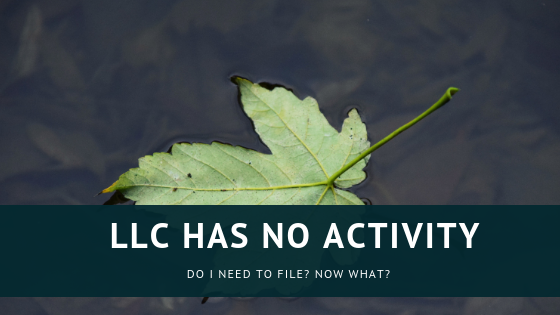LLC tax filing requirements depend on the way the LLC is taxed. An LLC may be disregarded as an entity (sole proprietor) for tax purposes, or it may be taxed as a partnership or a corporation.
Let’s take a look at the different scenarios.
LLC treated as a Sole Proprietor or Disregarded Entity
If an LLC has only one owner, or member, the IRS automatically disregards it for federal income tax purposes. This type of LLC is treated the same as a sole proprietor. The member reports the LLC business income and expenses on his or her personal tax return Schedule C.
Filing Requirements for Sole Proprietors
An LLC that is not considered a separate entity from its owner is taxed as a sole proprietor. Therefore, the LLC’s income and expenses are reported as self-employment income on Schedule C of the owner’s personal tax return. A taxpayer is required to file Schedule C if the LLC’s income exceeds $400 for the tax year.
A taxpayer would also want to file a Schedule C to take a loss on a business. The IRS recognizes that many businesses will have a loss in the first few years. Therefore, the IRS allows a loss on a business 3 out of 5 years. After three years of losses, the business would become a hobby in the eyes of the IRS. This would disallow any further loss unless there is a substantial change in the operation to try to turn the business around. I recommend consulting with a tax professional to know if a loss is allowed for your business.
If a sole proprietor LLC did not have business income exceeding $400 nor does it have any expenses to deduct, the taxpayer does not have to file Schedule C. However, the taxpayer still files a personal tax return to report other income.
LLC treated as Partnership
If an LLC has two or more members or owners, the IRS automatically treats it as a partnership. The LLC files an informational partnership tax return (Form 1065). The income and expenses of the partnership pass through to the owners’ personal tax returns. To learn more about pass through income, read this post.
Filing Requirements for an LLC Partnership
An LLC taxed as a partnership files an informational partnership tax return using tax Form 1065. However, if it did not receive any income during the year AND did not have any expenses that it will claim as deductions, then it is not required to file a return.
Thus, an LLC with no business activity that is taxed as a partnership is not required to file a partnership tax return unless there are expenses or credits that the LLC wants to claim.
Taken directly from the IRS website.
Question:
Must a partnership or corporation file an information return or income tax return even though it had no income for the year?
Answer:
Partnerships and corporations have different standards for filing an information return or income tax return. A domestic partnership must file an information return unless it neither receives gross income nor pays or incurs any amount treated as a deduction or credit for federal tax purposes.
I would suggest filing the partnership return without any income or expenses just to make sure the IRS doesn’t send you a notice of failure to file. Receiving this notice then makes you prove you had no reason to file in the first place. Generally, I say be proactive. If you have a registered partnership, then file the return for it.
The penalty for late filing of the partnership return is $195 per partner per month or part of a month for which the partnership information return is filed late, with the penalty capped at 12 months.
LLC treated as a S-Corporation
When an LLC elects to be taxed as a corporation using a Form 8832 with the IRS, the LLC must file a corporate tax return, even if it do not have any income. To clarify, all corporations including S-Corporations MUST file a tax return, even if they do not have any income.
The S-Corporation status happens by filing Form 2553 and having approval from ALL shareholders or owners. Without 100% approval from all owners, members or shareholders of S-Corporation election, it cannot happen.
Once an LLC has elected to be treated as a corporation (including an S-Corporation) for tax purposes, it must file a federal income tax return even if the LLC did not engage in any business during the year.
Filing Requirements for an LLC S-Corporation
An LLC that is taxed as an S-Corporation files a tax return using Form 1120S.
Once again the income and expenses get passed through to its owner, members and/or shareholders. Therefore, the S-Corporation doesn’t itself pay taxes. It simply sends the business income information to the IRS which can be checked on personal returns.
If your business is taxed as an S-corporation and files Form 1120S after the deadline, the IRS charges EACH shareholder a late filing penalty in the amount of $195 for each month, or part of the month, that the return is late for up to 12 months.
To recap
Even if your LLC has no business activity, it is important to understand your LLC tax filing status to know whether it is obligated to file a federal income tax return. Filing required returns on time can help your LLC avoid fines and penalties.
If you’re ready to get started, I suggest using Northwest Registered Agent to help you get registered and for their registered agent service.
Created with RV Entrepreneurs in mind but helpful for all businesses!
